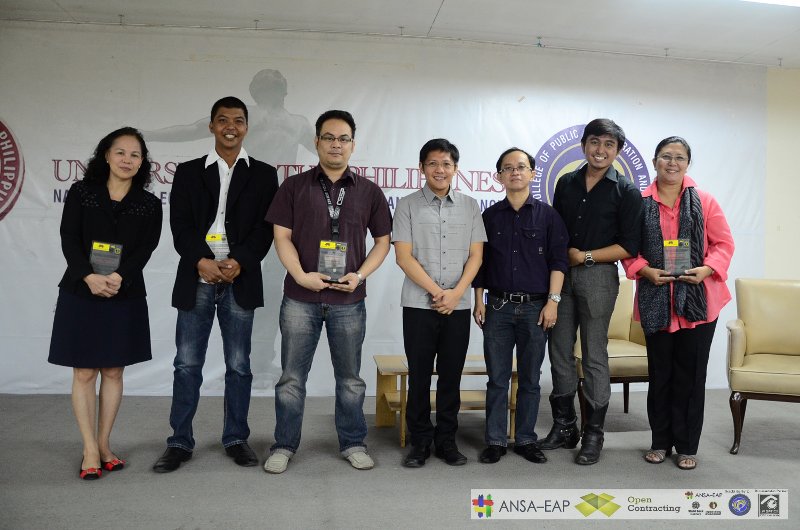The OC Symposium was held on 10th March, 2014, at the National College of Public Administration and Governance (NCPAG), hosted by the Center for Policy and Executive Development. It served as the culminating activity for “Open Contracting in the Classroom and Beyond,” an initiative aimed at linking the academe with the government and civil society organizations for social accountability.
Open Contracting (OC) refers to government disclosure and citizen participation in the entire public contracting process, from planning to fulfillment of obligations. It will hopefully result to better facilities and infrastructures, more efficient delivery of goods and services, and the furtherance of the protection of the rights and welfare of the population.
OCCB is a pilot project in Asia organized by ANSA−EAP Foundation, Inc in collaboration with the Ateneo School of Government and the World Bank Institute, spearheaded by ANSA-EAP’s Executive Director Redempto Parafina. It aims to gradually integrate OC awareness in education curricula, and introduces students as citizen monitors in furtherance of social accountability and good governance. It consisted of four phases: the OC Writeshop; the Cascading of Lessons; Research and Field Work, and finally; the OC Symposium.
Participating professor-consultants come different fields and universities: Flordeliz Abanto of Journalism from St. Scholastica’s College Manila; from the University of the Philippines Diliman, Jocelyn Cuaresma and Maynard Matammu of the National Center for Public Administation and Governance, and Jalton Taguibao from the Department of Political Science, College of Social Sciences and Philosophy. Participating institutions include government agencies like the Land Transportation and Regulatory Board, Department of Education, and Department of Transportation and Communication, among others, as well as civil society organizations like the Transparency and Accountability Network, Alliance of Concerned Teachers, and Partido ng Manggagawa, to name a few.
“[Open Contracting and Social Accountability] are integral parts in the discussion of leading theories of public administration, particularly New Public Management, Reengineering Government and Governance,” Professor Cuaresma notes.
“Mainstreaming these concepts in media can embolden the public to demand an active role in community affairs,” Professor Abanto adds.
The project, the professors agree, is a two-way street.
“The activity of the students does not just impart to students a model for participating in monitoring contracts or develop their skills in crafting monitoring tools but equally important, the findings can be used by the [government institution] to further improve its performance by ensuring that the provisions in the contract are satisfactorily met by the contractor,” says Professor Matammu.
There are a number of varying responses to the OC Project, and students as citizen monitors, and this depends highly on the government agency in question. For example, the Commission on Elections is open to these initiatives by students; the head of the Procurement Office of the University of the Philippines Diliman, the national state university, lauded the project and is recommending it to UPD’s Vice-Chancellor for Academics for formal inclusion into the syllabi of related courses. Other government institutions, however, are not as open. As an example, some Local Government Units (LGUs) deeply entrenched in traditional political systems are very resistant to releasing contract information, citing privity and confidentiality of contracts.
The OCCB model involving professors and students from both public and private universities has also been lauded online by developmental practitioners. It has been praised for tapping tertiary-level professors to guide students in understanding the entire process of contracting, especially in the Southeast Asian region. Indeed, it has been shortlisted as a finalist for the Ashoka Changemakers Close the Loop contest, a worldwide competition that seek innovative solutions that are helping feedback loops to empower people, drive better decisions, and put resources where they’ll make a difference.
As for sustainability, Professor Taguibao offers this thoughts.
“The ideas of OC and SAc may be disseminated by including it in the syllabus of courses that are relevant, or those that exhibit some topical affinity with them,” he says. “Another way to sustain and institutionalize it is to ensure a constant flow of academic/research papers that further explore OC, not just conceptually but also empirically. Case studies that have to do with OC will be a very good resource for young scholars who might be interested in inquiring and investigating about OC.”
Clearly, the role of citizens in Open Contracting is essential, as it forms a pillar on which the entire process stands. Citizenry is composed of a number of actors, including organized civil society groups lobbying for common causes, local communities, and various social sectors. One of these key groups is the youth.
“The youth has traditionally been overlooked when it comes to issue consultation and resolution, by reason of lack of extensive experience in governance,” Chad Osorio, OCCB Project Coordinator, states. “But what we lack in years we make up with enthusiasm and a fresh outlook.”
In sum, OCCB has a great potential, and hopefully gains more traction for self-sufficiency in the future.
Pictures from the OC Symposium can be seen below
View all the pictures here
View and download the videos and presentations here
*** Special thanks to the Center for Policy and Executive Development, National College of Public Administration and Governance, for hosting the OC Symposium, and; the UP Photography Society (UP Optics) for documentation.

